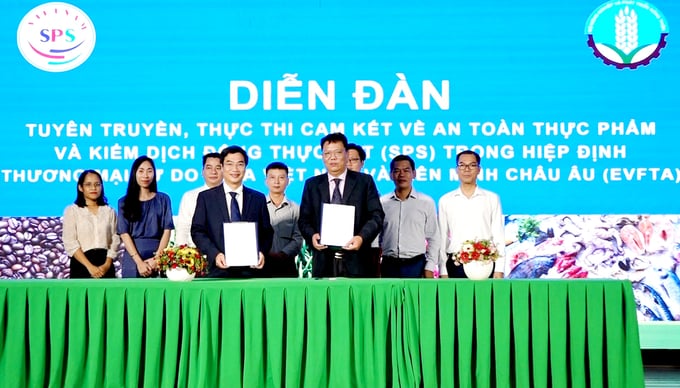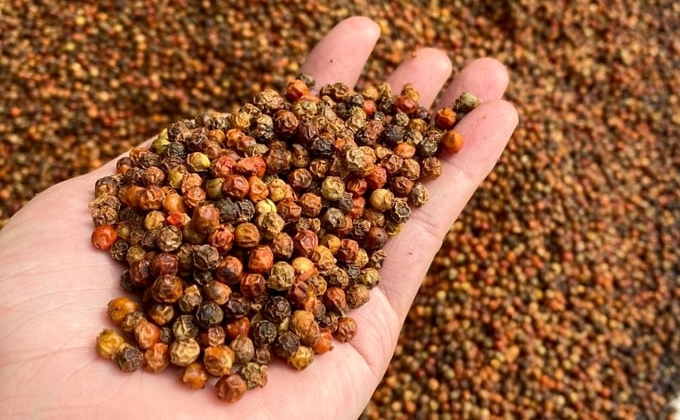November 24, 2025 | 16:28 GMT +7
November 24, 2025 | 16:28 GMT +7
Hotline: 0913.378.918
November 24, 2025 | 16:28 GMT +7
Hotline: 0913.378.918

Vietnam SPS signed a memorandum of cooperation with the School of Public Policy and Rural Development on training relevant human resources to implement SPS. Photo: Thanh Son.
At the Forum "Propaganda and Implementation of commitments on SPS in the Free Trade Agreement between Vietnam and the European Union", jointly organized by the Vietnam SPS and the School of Public Policy and Rural Development in Ho Chi Minh City on November 3, Mr. Ngo Xuan Nam, Deputy Director of Vietnam SPS, said that in the first 10 months of 2023, the EU issued 3,865 food safety warnings for agricultural and food products. import. Of these, 55 warnings for agricultural products and food imported from Vietnam into the EU, accounting for 1.4%. Thus, Vietnam's warning rate is low.
Vegetables and fruits are the most warned product group with 23 cases, followed by seafood products (19) and confectionery and other processed products (13). Violations due to chemical residues accounted for 58%, violations due to mycotoxins accounted for 9%, and other violations accounted for 33%.
Also, according to Mr. Nam, in the new generation Free Trade Agreements (FTAs) that Vietnam is participating in, there is a mandatory content that must be implemented: SPS (The Agreement on the Application of Sanitary and Phytosanitary Measures sets out the basic rules for food safety and animal and plant health standards).
With the EVFTA, up to now, we have basically implemented regulations on food safety and disease safety very well. However, food safety and disease safety control measures are always updated regularly by the EU. Every 6 months, the EU reviews all businesses exporting agricultural products and food to this market. If we always enforce and comply well with the regulations in the EVFTA, the EU can consider reducing the frequency of inspections, regulations, and procedures for Vietnamese agricultural products and food imported into the EU. On the contrary, if not done well, Vietnamese agricultural and food products imported into the EU will be subject to increased inspection frequency.
Not only must they meet EU regulations on SPS, agricultural products and food imported into this market must also satisfy consumer standards. Master Dinh Duc Hiep (SPS Vietnam), said that normally in the EU, buyers' standard requirements are often higher than EU legal regulations, the MRL level is often 30-100% higher.
Therefore, to sell products, businesses need to determine which market, who the buyer is, and what requirements they have to fulfill. European buyers often have specific requirements depending on their sales channels and product segments. Common buyer requests include GLOBALG.A.P, certification, and compliance with social and environmental standards.

Agricultural products exported to the EU must meet regulations on food safety and disease safety. Photo: Thanh Son.
Buyers often make the following requirements: Food safety management system based on hazard analysis and critical control points (HACCP); GLOBALG.A.P (covers the entire agricultural production process from before the crop is put into the ground to the unprocessed product. GLOBALG.A.P focuses on food safety as well as the environment and labor conditions and product quality).
In addition to GLOBALG.A.P, other food safety management systems may also be required. Almost all buyers in the northwestern European market (including the UK) will require the BRC global standard, widely adopted as a food safety and hygiene standard. In Germany, IFS food standards are very popular.
On October 27, the Vietnam SPS (Ministry of Agriculture and Rural Development), in conjunction with the Dong Thap Department of Agriculture and Rural Development, organized a conference to disseminate regulations and commitments on SPS in the free trade agreement between Vietnam and the United Kingdom of Great Britain and Northern Ireland (UKVFTA). The conference answered questions about food safety and plant quarantine regulations for businesses, cooperatives, guilds, and farmers engaged in agricultural production for export in Dong Thap province.
Mr. Ngo Xuan Nam, Deputy Director of the Vietnam SPS, said that in the past, agricultural farmers only focused on achieving as high an output as possible. But since 2007, when Vietnam joined the WTO, the Ministry of Agriculture and Rural Development has been focusing on product quality, food safety, and animal and plant disease safety. It considers this a particularly important issue to protect consumers' health worldwide. In addition, exporting and importing agricultural products into a certain country must require agricultural products to be disease-free to avoid spreading pathogens from one country to another.
Regarding plant quarantine, Master Luong Ngoc Quang, Head of the Department of International Cooperation and Communications (Department of Plant Protection), noted to manufacturers and exporters of agricultural products to the EU about the EU's list of 20 priority pest species. In particular, there are 12 EU plant quarantine subjects present in Vietnam, including: Bacterial ulcer disease on citrus trees; Citrus tristeza virus; bacterial wilt; Oriental fruit fly; Tobacco whitefly; Thrips On Pepper Plants; Thrips damage melons; Leaf flies damage vegetables; Celery leaf fly; cavities; fall armyworm; Corn earworm.
Translated by Tuan Huy

(VAN) Viet Nam is entering the pivotal period of 2025-2030, moving toward the formulation of the Remote Sensing Law, which will establish a legal foundation for the development of national digital data.

(VAN) The agricultural sector is finalizing the strategic framework for emission reduction, setting the goal of sharply cutting methane and 403.7 million tons of CO2 equivalent and moving toward Net Zero by 2050.
/2025/11/22/2236-1-153832_483.jpg)
(VAN) The National Marine Spatial Planning is opening up opportunities for sustainable blue sea development across 21 coastal localities.

(VAN) Viet Nam’s forestry sector is undergoing a comprehensive transformation, strengthening management, protection, and development efforts to maintain ecological security and drive green, sustainable growth.

(VAN) Viet Nam is accelerating efforts to digitize reservoir operations, from real-time data to hydraulic modelling.
/2025/11/21/3348-2-102623_454.jpg)
(VAN) National Assembly delegate Nguyen Thi Lan has proposed adding special mechanisms to attract human resources to the agricultural, forestry, and fishery sectors, addressing the shortage of high-quality personnel.

(VAN) Over the past two decades, the unified legal framework for water resource management has been perfected, becoming a crucial foundation for ensuring national water security.